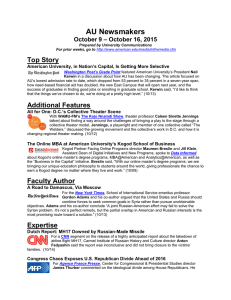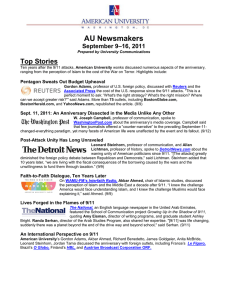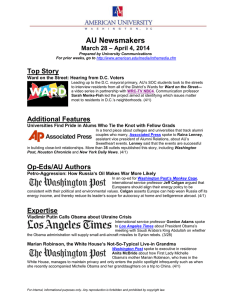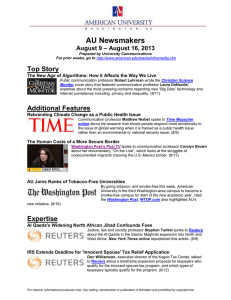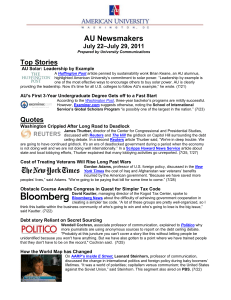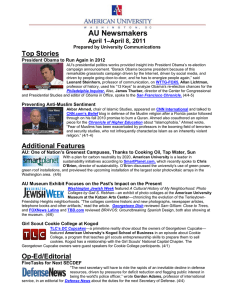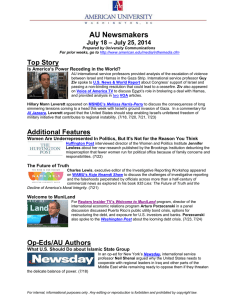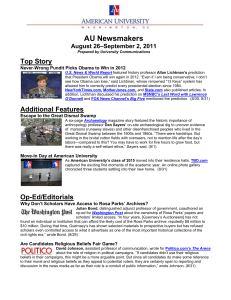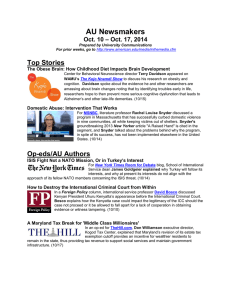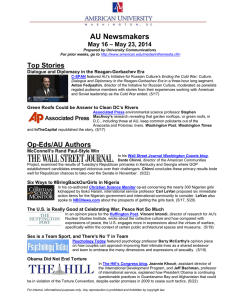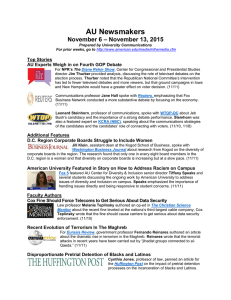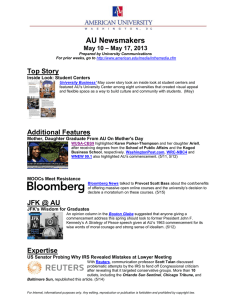AU Newsmakers Top Stories –9, 2011 September 2
advertisement
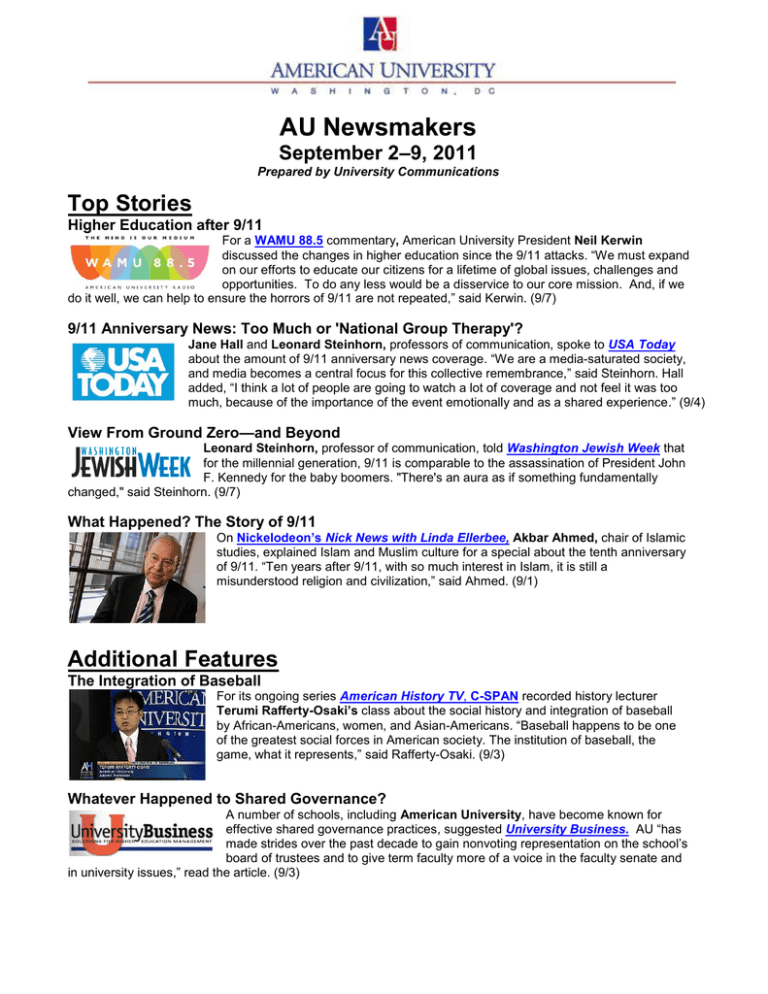
AU Newsmakers September 2–9, 2011 Prepared by University Communications Top Stories Higher Education after 9/11 For a WAMU 88.5 commentary, American University President Neil Kerwin discussed the changes in higher education since the 9/11 attacks. “We must expand on our efforts to educate our citizens for a lifetime of global issues, challenges and opportunities. To do any less would be a disservice to our core mission. And, if we do it well, we can help to ensure the horrors of 9/11 are not repeated,” said Kerwin. (9/7) 9/11 Anniversary News: Too Much or 'National Group Therapy'? Jane Hall and Leonard Steinhorn, professors of communication, spoke to USA Today about the amount of 9/11 anniversary news coverage. “We are a media-saturated society, and media becomes a central focus for this collective remembrance,” said Steinhorn. Hall added, “I think a lot of people are going to watch a lot of coverage and not feel it was too much, because of the importance of the event emotionally and as a shared experience.” (9/4) View From Ground Zero—and Beyond Leonard Steinhorn, professor of communication, told Washington Jewish Week that for the millennial generation, 9/11 is comparable to the assassination of President John F. Kennedy for the baby boomers. "There's an aura as if something fundamentally changed," said Steinhorn. (9/7) What Happened? The Story of 9/11 On Nickelodeon’s Nick News with Linda Ellerbee, Akbar Ahmed, chair of Islamic studies, explained Islam and Muslim culture for a special about the tenth anniversary of 9/11. “Ten years after 9/11, with so much interest in Islam, it is still a misunderstood religion and civilization,” said Ahmed. (9/1) Additional Features The Integration of Baseball For its ongoing series American History TV, C-SPAN recorded history lecturer Terumi Rafferty-Osaki’s class about the social history and integration of baseball by African-Americans, women, and Asian-Americans. “Baseball happens to be one of the greatest social forces in American society. The institution of baseball, the game, what it represents,” said Rafferty-Osaki. (9/3) Whatever Happened to Shared Governance? A number of schools, including American University, have become known for effective shared governance practices, suggested University Business. AU “has made strides over the past decade to gain nonvoting representation on the school‟s board of trustees and to give term faculty more of a voice in the faculty senate and in university issues,” read the article. (9/3) Sassafras the Beagle Still Missing: AU Community Assists in Search According to the Washington Post, an AU graduate student and staff member are actively engaged in the pursuit to locate a local family‟s beloved missing dog. “Your initial reaction is to be amazed that someone would go to these lengths. But then you understand that there really is an emotional core involved,” said student Jon Hussey. WJLA-ABC7 also aired a segment. (9/2, 9/5) Op-Ed/Editorials Lashkar-e-Taiba's American Connections Stephen Tankel, assistant professor of justice, wrote in Foreign Policy magazine about a Woodbridge, VA, terrorist suspect, with connections to the extremist group Lashkar-e-Taiba (LeT). “One of the questions that vexes U.S. policy makers and security practitioners with regards to LeT concerns what level of training constitutes „membership,‟ as it pertains to real command-andcontrol,” wrote Tankel (9/6) Megabanks Growing Even More Dominant Wendell Cochran, professor and senior editor of AU‟s Investigative Reporting Workshop, wrote an article for MSNBC’s BankTracker about how the current financial crisis is shaping the future of American banking. “It is going to be significantly smaller, and the domination of a relative handful of behemoth institutions is going to increase,” wrote Cochran. (9/8) Quotes Congress Is Back in Session, but Can It Find Compromise? James Thurber, director of the Center for Congressional and Presidential Studies, spoke on NPR’s All Things Considered and to the Kansas City Star about the challenges Congress faces in its new session. “The American people have had it. They never like Congress very much unless there‟s a crisis. But this is worse now,” said Thurber to the Kansas City Star. Thurber also spoke to the New York Times about the potential conflict of interest created when Rep. Shelley Berkley‟s official duties benefit her husband‟s medical practice. (9/6) Obama Can’t Lose Allan Lichtman, professor of history, appeared on MSNBC’s The Daily Rundown to reaffirm his year-old prediction that President Obama will win in 2012. “If [Obama] loses six or more, he‟s out. Fewer than six, the incumbent party wins,” said Lichtman, referring to his 13 Keys system. (9/6) In Jobs Speech, Obama Passes the Buck to Congress David Kautter, managing director of the Kogod Tax Center, discussed with U.S. News & World Report why President Obama‟s American Jobs Act— even with the proposed incentives— may not prompt employers to hire more workers. “Hiring is a serious decision for most businesses. Most businesses would like to see some possibility of a sustained need for the worker,” said Kautter. Wanted: Astronauts for Missions Unknown Howard McCurdy, professor of public administration, spoke to New Scientist magazine about NASA‟s astronaut corps after the retirement of the space shuttle. According to McCurdy, “it is hard to predict the number of astronauts needed because it is not clear what human space missions NASA will be asked to do in the future, or whether they will be funded.” (9/6) What’s Next for Caribbean Ecosystems? Kiho Kim, associate professor of environmental science, spoke to the Water Environment Federation‟s Water Environment & Technology Magazine about the nitrogen pollution affecting coral reefs in Caribbean waters. “If we can determine which source is causing the greatest damage, public policy can be shaped to respond to and mitigate it,” said Kim. (9/7) Aggressive Political Discourse Becoming the Norm On WUSA-CBS9, Dotty Lynch, executive-in-residence in the School of Communication, analyzed the rise in aggressive political discourse and its emergence in new forms, such as a video game in which players shoot and kill the zombie forms of conservative political and media personalities. “We have seen too many examples of that violence going into the real world,” said Lynch. (9/6) Downgrade Latest Body Blow for an America on the Ropes Mark Waldman, executive-in-residence in the Kogod School of Business, analyzed for The Bottom Line, Canada‟s financial planning magazine, how politicians‟ actions resulted in the S&P‟s U.S. credit downgrade. “They were just scoring points trying to prove the other guy wrong. The S&P looked at that process and said, we‟re never going to get out of our problem if we keep dealing with it this way,‟ Waldman said. (9/7)
